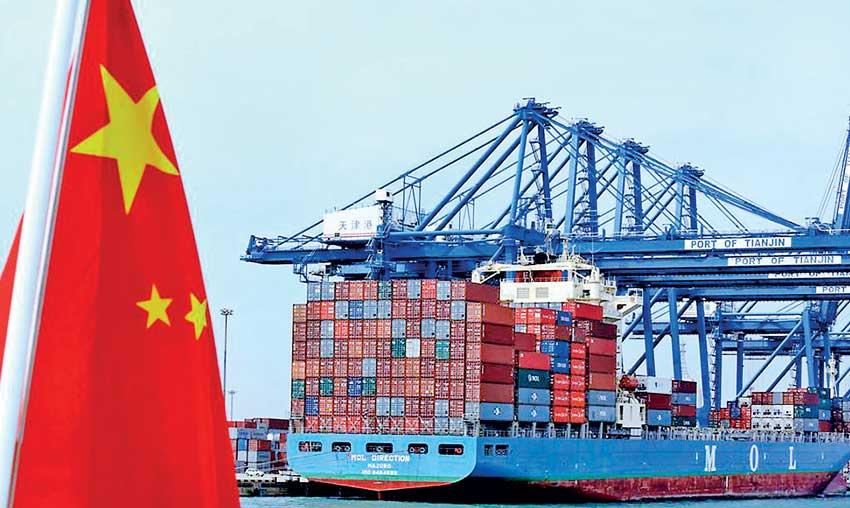Reply To:
Name - Reply Comment
Last Updated : 2024-05-07 01:51:00

In 2000, China accounted for just 1.2 percent of global trade but in 2018, its share was one third, according to data from the World Bank.
 The economic fallout of the Chinese New Coronavirus or COVID - 19 is far-reaching. It will eventually pass as any other pandemic or calamity the world has seen but will certainly change the political and economic playbook, which many countries, including Sri Lanka have gotten used to.
The economic fallout of the Chinese New Coronavirus or COVID - 19 is far-reaching. It will eventually pass as any other pandemic or calamity the world has seen but will certainly change the political and economic playbook, which many countries, including Sri Lanka have gotten used to.
There are reasons to remain positive that it will pass as a public-health scare as mankind has overcome bigger challenges in the history, and the world is in an age of medical miracles, hence one need not have doubts about our capabilities in defeating this pandemic.
However the virus will certainly alter the conventional economic wisdom which framed much of the economic order. It will also pose questions which will demand the attention of all nation states, policy makers, and businesses which require deep reckoning of the relevance of the conventional global order in politics, national security and economics which dominated the past four to five decades.
While the three are inevitably intertwined as each one will have implications on the other, the focus in this piece is economics, although in recent times, a country’s economic policy has become cornerstone in determining its national security.
There are few key economic eye-openers that have surfaced from COVID -19;
It’s an easy choice but needs robust political will.
One big caveat
The old adage was when America sneezes, the world catches a cold but with China’s phenomenal rise since it joined the World Trade Organisation in 2001, China replaced ‘America’ in the old phrase as China became the ‘go-to’ place for Western and European manufacturers to outsource their production for lower labor costs and didn’t think twice in shutting down their plants back home and the result, China became the world’s factory.
But today, what is most fitting is ‘When China sneezes, the world catches coronavirus’, a fatal pneumonia which has forced virtually the entire world in to lockdown. That was the magnitude of the economic clout of People’s Republic of China since it started reforming its economy under Deng Xiaoping after the death of Mao Zedong’s state grip of the economy, which received a huge flywheel since it joined the WTO in 2001, albeit it openly flouted the WTO rules but now being confronted.
China’s remarkable economic rise is exemplary as no other country could lift over a billion people out of poverty in just forty years with an annual economic growth averaging 9.5 percent from 1978 to 2013.
China now accounts for nearly a third of global GDP growth, up from around 3 percent in 2000. Between 2000 and 2017, the world’s economic exposure to China has tripled, McKinsey Global Institute estimated.
In 2000, China accounted for just 1.2 percent of global trade but in 2018, its share was one third, according to data from the World Bank.
Today, China is the largest exporter in the world and its trade as a percentage of GDP has steadily risen from 12.4 percent in 1980 to 38.2 percent in 2018. The corresponding figures for the US, the world’s largest economy is 20.1 percent and 27.5 percent.
No wonder why the global supply chains are feeling the tremors from the two months of near China shut down. From manufacturers around the world from the closest Japan to South Korea to more distant locations in the US to Germany, it sent ripple effects across the supply chains.
Sri Lanka also had its fair share of troubles, particularly in the industries of textiles and construction although there could be many other ancillary industries which are feeling the pinch due to the spillover effects of the supply chain squeeze but have gone unreported.
Sri Lanka’s apparel producers last week feared they could go out of work if the supply chain disruptions persist longer. Sri Lanka currently sources 25 percent of its fabric from China.
Fortnight ago the Central Bank said in 2019 China accounted for 18 percent of Sri Lanka’s consumer goods imports, 16 percent of intermediate goods imports and 33 percent of investment goods imports. This is substantial.
“ The world’s ability to avoid production and supply chain disruption fell dramatically as it became more dependant on China for intermediate goods”, Chi Lo, BNP Paribas Senior Economist for greater China wrote in a note recently.
So, it is no brainier that its time that all nations should start diversifying their supply chains, if not looking at in-shoring whenever possible.
Serious case for import substitution
While import substitution may be a forbidden tactic in the market fundamentalists’ play book, it is time that every country starts seriously exploring ways and means of producing stuff which can be domestically produce with domestic workers.
The idea behind free trade is straight forward; if two or more countries that each specialise in making products others can’t, agree to trade those products without tariffs or taxes, then all countries can benefit by exporting large amounts of their specialty products.
While in theory this may be true, what’s missing in this pro-free trade mantra is that all countries almost never benefit equally. The country that benefits the most is the country that produces the most number of products that are highly consumed by a majority of countries in the free (or preferential) trade agreement. And that country is today, the People’s Republic of China.
Further it also makes sense to enter in to agreements to buy goods we actually need. It is no good deal if we import something we can already produce at home with
domestic workers.
The argument that the market fundamentalist almost often bring is the fact that cheap labor and material costs available in the foreign country allow them to either produce (if outsourced) or source (import) them at a cheaper price and make them available for the consumers at the home country at lower prices - a case for higher standard of living for the home
country consumers.
What this narrative ignores is the fact that when Sri Lanka source or outsource products which can be manufactured domestically for cheaper labor or materials, Sri Lankans either lose jobs or it doesn’t create jobs in the least, in the productive sectors which give a living wage. (No wonder why over a million plough on the streets of the metropolis in Sri Lanka).
What good is a cheaper widget, if you don’t have the paycheck to buy it?
Long overdue global trade rebalance
Rebalancing of the global trade order is no longer a choice but an imperative. COVID-19 reinforced it more than anything else has done as it hit many companies in many countries when they felt that they are at the mercy of China (or any other one country) when their stocks started running out and machines started sputtering.
The world saw the first part of this re-balancing of global trade during the last three years which concluded with a Phase I deal this January when the US confronted China in the trade front. It did the same with Mexico and Canada rewriting the NAFTA and with South Korea. It does with Europe, Japan and a new trade deals are on the cards with the UK and India while talks with China continues for more fair trade.
Some who could read the currents, diversified their supply chains to nearby countries or did in-shoring all or part of their manufacturing. But some who could not read the currents waited until things relapse in to the old order, as they were never ready for the new order and they never relapsed.
The one and the major reason is that, that exercise did not fall in line with the narrative of the no-skin-in-the-game policy making clerks and the semi-intellectual experts in the so called think tanks with some Ivy League education and the journalist cohort who feed in to their narrative day and night.
They labelled it as a ‘trade war’ from the very beginning and continued to pounce on those who behind it as ‘mad men’.
What actually happened with China and all else so far and what will happen in the future will be a long overdue rebalancing of trade, a process which others like Sri Lanka should also get in the game seeking more favourable terms for the domestic worker and the economy.
Need for new economic playbook
As the severity of COVID-19 becomes clear, the pandemic is showing a dangerous dependence on China, or any other one country for supply chains as it has become more than a public-health problem.
While the crisis will eventually pass, this will certainly change political and economic assumptions in some fundamental ways, for the better.
Just imagine a world where most of our life saving pharmaceutical drugs and medical devices are produced in China or any other one country. What kind of a national security threat could it pose to every nation state?
While Sri Lanka sources most of its pharmaceutical drugs from India, India faced a shortage of a raw material needed to make paracetamol, the common fever and pain reducer, as Chinese supplies dried up in recent weeks, according to Financial Times.
This is why it was said in the beginning of this piece that there is closer linkage between trade and economics and national
security of a nation.
While the COVID-19 threat exposed world’s and Sri Lanka’s over-dependence on China for supplies, this could happen at anywhere and pandemics may come and go.
But the message is clear to our policy makers and the industrialists ; that is, it is time Sri Lanka starts diversifying its supply chains, starts in-shoring what is possible to produce domestically and invest in import substitution in whichever the sectors that is possible, because production and jobs create more wealth and contentment, than an instant gratification one receives from a cheaper widget from elsewhere.
(The writer can be reached
via dilinainbusiness@gmail.com)

Add comment
Comments will be edited (grammar, spelling and slang) and authorized at the discretion of Daily Mirror online. The website also has the right not to publish selected comments.
Reply To:
Name - Reply Comment
US authorities are currently reviewing the manifest of every cargo aboard MV
On March 26, a couple arriving from Thailand was arrested with 88 live animal
According to villagers from Naula-Moragolla out of 105 families 80 can afford
Is the situation in Sri Lanka so grim that locals harbour hope that they coul
4 hours ago - 0 - 224